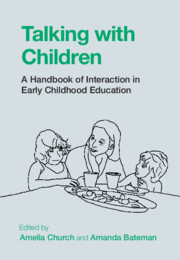Book contents
- Talking with Children
- Talking with Children
- Copyright page
- Dedication
- Contents
- Figures
- Tables
- Contributors
- Acknowledgements
- Notes on Transcription Conventions
- Introduction
- Part I Talk as Social Action
- 1 Conversation Analysis for Early Childhood Teachers
- 2 Sequences
- 3 Participation
- 4 Embodiment
- 5 Emotion
- 6 Socialization
- 7 Epistemics
- Part II Pedagogy in Interaction
- Part III Interaction and Inclusion
- Index
- References
1 - Conversation Analysis for Early Childhood Teachers
from Part I - Talk as Social Action
Published online by Cambridge University Press: 16 June 2022
- Talking with Children
- Talking with Children
- Copyright page
- Dedication
- Contents
- Figures
- Tables
- Contributors
- Acknowledgements
- Notes on Transcription Conventions
- Introduction
- Part I Talk as Social Action
- 1 Conversation Analysis for Early Childhood Teachers
- 2 Sequences
- 3 Participation
- 4 Embodiment
- 5 Emotion
- 6 Socialization
- 7 Epistemics
- Part II Pedagogy in Interaction
- Part III Interaction and Inclusion
- Index
- References
Summary
Research evidence in early childhood education and care underscores the importance of high-quality interactions between children and educators – be they teachers, childcare workers, parents or family members – for improving children’s outcomes. We know that rich conversations can support and extend children’s interests through language and attuned feedback, essential for children’s learning and development. The introductory chapter explained that while the importance of high-quality interactions is widely acknowledged in early childhood education, how this can be achieved deserves more attention. Every chapter in this book details particular types of talk between children, their peers and educators, where all authors use conversation analysis to achieve this goal. The aim of this chapter is to introduce and explain the fundamentals of the methodology of conversation analysis and how conversation analysis is ‘done’ so that readers can engage with the analysis and findings in the chapters that follow. We also draw attention to the usefulness of a conversation analysis approach in ECEC research and practice.
Keywords
- Type
- Chapter
- Information
- Talking with ChildrenA Handbook of Interaction in Early Childhood Education, pp. 21 - 37Publisher: Cambridge University PressPrint publication year: 2022

